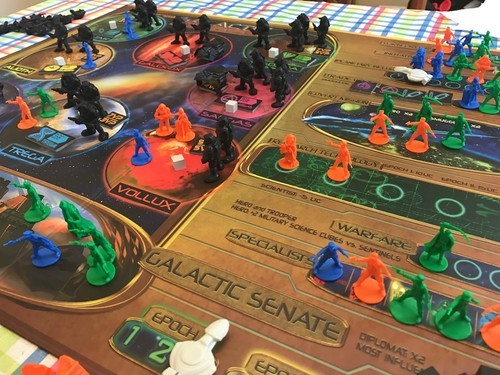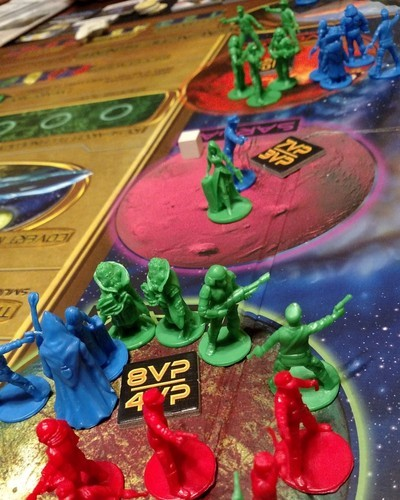Empires: Galactic Rebellion Review
on Oct 19, 2017
Critical Hits: Expansive options, epic scale, top notch production quality
Critical Misses: Obfuscated consequences, unbalanced arc, weak integration of setting and mechanics
The Empire deploys monstrous sentinels to the planets of the galaxy as they attempt to quash a burgeoning rebellion. In back alleys, factions bicker and scheme to both end the Empire and take control for themselves. At stake is the future of the galaxy: totalitarian rule or democratic utopia.
At least I think so. There’s a paragraph in the rulebook that explains the theme but that’s about the last place you’ll truly interact with it. It’s there, in the retro-art and rulebook, but that setting doesn’t translate to the mechanics. That’s ok in some ways as the highs of this game are independent of the theme. Unfortunately, the lows are tied directly to it.
Empires: Galactic Rebellion is big, literally and figuratively. Eagle-Gryphon typically spoils you on components and this game is no different. Each faction has 80 individual miniatures in addition to the Sentinels, the cardboard tokens are among the thickest you’ll ever play with, and everything from the box to the resource tokens are infused with a 80’s sci-fi tech aesthetic. There are covert missions to go on, technologies to research, the senate to influence, and money to raise. Oh, you can’t forget to actually send people to the planets you’re trying to control.
The options are expansive and there are many ways to approach each problem. Hulking Sentinels threaten military action on each planet. You could beef up your military and deploy heroes, or you could send diplomats to the Senate and convince the Empire to move those Sentinels elsewhere. Economic dominance is one way to raise the capital you need, or you could focus on Scientists and upgrade on the cheap. This is precisely the kind of Worker Placement games I like. You are rarely locked out of anything because someone took fish before you did; instead you have to tackle each problem from various angles all in service of a grander strategy.

Options galore.
The worker placement pressure comes from never having enough tools to do everything, not from being locked out of anything. The system rewards flexibility and an ability to navigate the shifting priorities of you and your opponents. There isn’t a catch-up mechanic per se, but there also isn’t a runaway leader. You’re in it until the end, and the Epoch 3 Technologies that boost VP gains across every aspect help to ensure there is no 1 or 2 “right†ways to play.
Unfortunately, their inclusion at the end of the game is but a single example of the biggest issue I have with Galactic Rebellion. The effects of a lot of really important decisions and actions are not always apparent and have delayed consequence. The enemy Sentinels represent an existential threat but are a big communal action problem. They must be dealt with early, but it’s extremely difficult to recognize the warping effect they have on the end game until you’ve played once - especially considering that you’ll score for planetary control twice in the game before you have to fight them.
Suddenly and abruptly the smooth engine of rebellious plotting grinds to a halt while you pull cubes in an out of a bag to determine who gets to score only ⅓ of the total available area control points. To be clear, I like the combat. I even like the idea of the Galactic War; I just don’t particularly care for the execution of it. For two thirds of the game you’re hardly aware there’s a rebellion at all. Then suddenly they wake up and get all shooty.
On each planet, the Sentinels will turn their attention to the person with the most units and attack them until either that player is destroyed or the Sentinels are. This leads to the frequent situation where the player in first place loses just enough units to lose control, while still eliminating all of the Sentinels. Frankly, it feels bad. It doesn’t make sense that the Sentinels don’t turn to attack the other player when they take the dominant position. It doesn’t feel great to lose a planet you spent time dominating, nor to win one when you didn’t do anything.

Getting a little crowded. Different specialists bring different benefits to bear.
These major issues do eventually fade away after repeated plays, but you’ve got to get there. More importantly: your group has to be willing to get there. I quite like Galactic Rebellion but unfortunately I can’t play it by myself and this isn’t the kind of game that is going to grab a group and blow them away on the first play. Even if you can manage to convince them of the importance of the Galactic War and lay out all the late game VP Technologies, it still feels a bit more like managing the bureaucracy of a Rebellion than fighting it. The worker placement area control game that you play isn’t quite the one promised by the setting.
For 8 rounds this game provides a compelling experience that combines a few classic mechanics. Getting new workers requires constant investment and so you have to balance snatching up future specialists for next turn without sacrificing too much on this one. All the specialists are great at a few things (except Troopers, objectively worse than Heroes in every way) and they even provide an element of bluffing. Diplomats, for example, may signal that you’re making a play into the Senate only to surprise your opponents when they’re used to accelerate your control of Orange Planet 2.
Galactic Rebellion is a fine game. There are groups out there that will really enjoy this Euro-centric game of rebellion. In some ways, the game reminds me of Eclipse for people who prefer Worker Placement to 4x. Those people will find a game with rich layers of decisions and flexible strategy, where long term considerations must wrestle with immediate decisions about where to focus.

 Customer Support
Customer Support  Subscribe
Subscribe 




 Account
Account  Wishlist
Wishlist 

